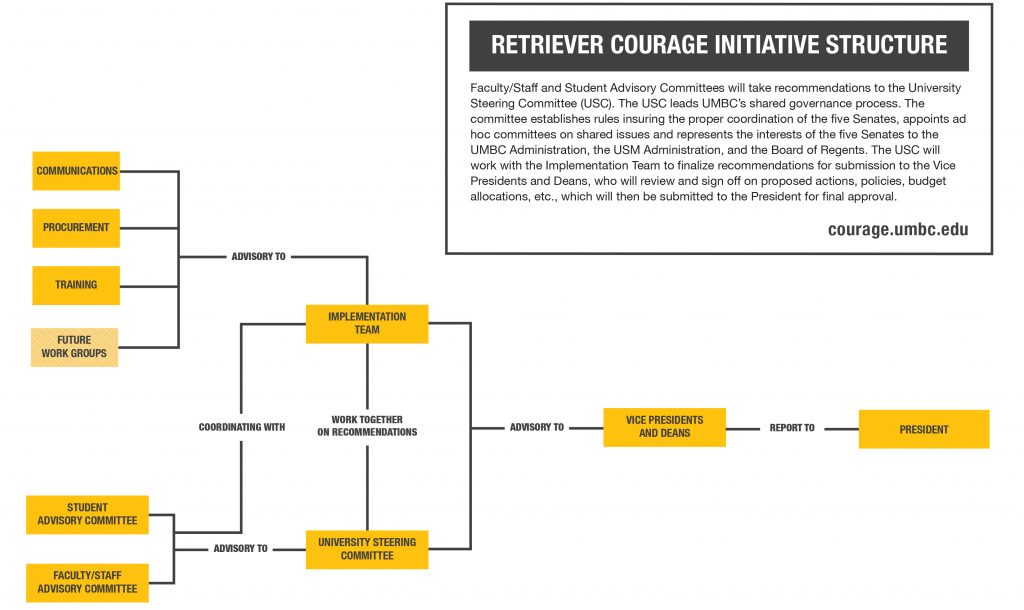The following three reports from 2019 include assessments of UMBC’s current practices, policies, and resources, and recommendations based on effective practices on our campus, evidence-based research, and best practices at other universities. These reports were compiled, respectively, by three groups:
- External consultants’ report (Jody Shipper, J.D., and Cherie Scricca, Ed.D. of Grand River Solutions,Inc.)
- Retriever Courage Student Advisory Committee report
- Retriever Courage Faculty/Staff Advisory Committee report
The Retriever Courage Implementation Team reviewed and compiled the recommendations in all three reports in preparation for a discussion about priorities with the University Steering Committee (USC) in fall 2019. The Implementation Team and USC then sought feedback and revisions from all Retriever Courage partners and the university community, after which prioritized action steps were recommended to the University Council of Vice Presidents and Deans, who then reviewed and signed off on proposed actions, and submitted them to the President for final approval.
Retriever Courage partners continued to work with members of the UMBC community to plan and implement projects. Many projects directly responding to UMBC community input have been completed or are underway. Examples include additional counseling staff, campus lighting improvements, new campus ID cards, Retriever Courage displays with resource brochures, in-person Title IX/sexual misconduct prevention and response training completed by over 2000 community members with more to come, and pilot training for 200 students.
Report process
These reports, part of the collaborative Retriever Courage process, are grounded in shared governance and input from the UMBC community. Retriever Courage involves dozens of partners across the university, including groups that are advisory to the University Steering Committee (USC). The consultants, Shipper and Scricca, were selected in January after a formal competitive procurement process by committees of students, faculty, and staff.
Shipper and Scricca’s report is based on nearly 50 interviews with Retriever Courage partners and additional groups of students, faculty, and staff recommended by partners and the consultants, including survivors of sexual violence/misconduct; information gathering sessions open to the UMBC community; feedback through an anonymous Google form; and a review of current university processes, policies, procedures, and practices regarding sexual violence/misconduct prevention and response. The Student and Faculty/Staff Advisory Committees developed their recommendations based on meetings with constituents and subcommittee research into the history of UMBC’s policies and practices and ways that other institutions have addressed sexual violence/misconduct.
Thanks to our community!
Thanks to the consultant team, the Student Advisory Committee, and the Faculty/Staff Advisory Committee for these reports as we continue to address together how to improve community safety and wellbeing at UMBC.
Thanks to the thousands of faculty, staff, and students who have participated in the internal and external reviews and recent training sessions. Thank you for your commitment to making UMBC a safer, more caring living, learning, and working environment for all, including engagement with Retriever Courage, and for the input and suggestions you are sharing to inform this work. We will continue to provide updates on progress and ways to stay engaged.
